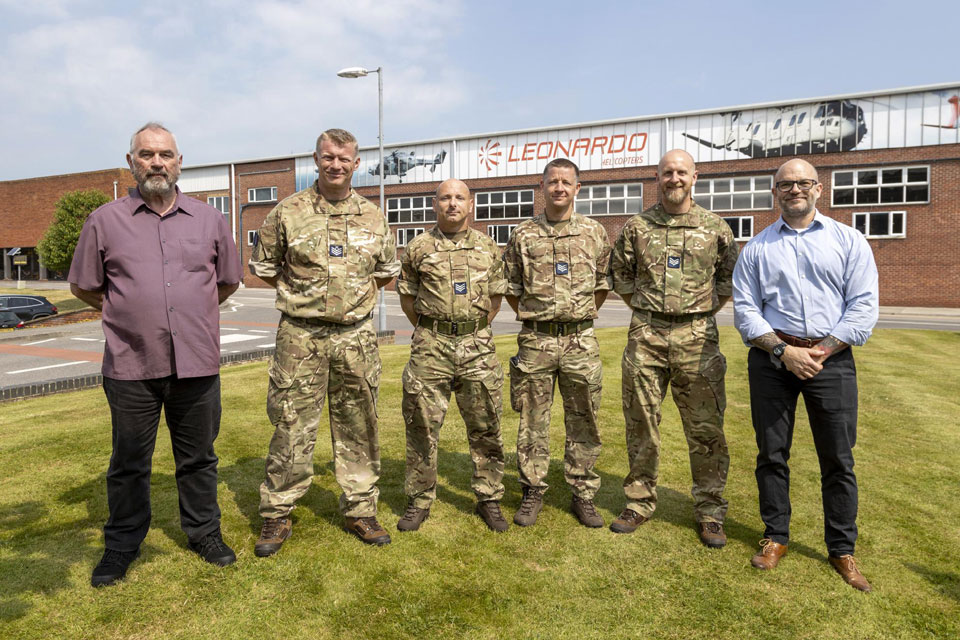“I served in the Royal Navy for just short of 31 years. I joined the Fleet Air Arm straight from school in 1989 aged 17 and remained until 2020, which is when I joined Leonardo,” says Julian.
“My trade with the Royal Navy was ‘M’ (mechanical). During my time in the military, I served with various Squadrons including 845 Naval Air Squadron (NAS) (Sneaking MKIV)), 1710 NAS (Repair) and, more recently, with the Royal Air Force (RAF) 71 (Inspection & Repair) Squadron where I worked on an exchange role.
“At Leonardo, I’ve continued my role as a Non-Destructive Testing (NDT) Level 3 Specialist. I work in the Materials Laboratory in our Yeovil Helicopters facility, covering the methods of Eddy Current Inspection, Magnetic Particle Inspection, Penetrant Inspection Testing and Acid Etch Inspection. I also work closely with Ministry of Defence (MOD) NDT personnel at 1710 NAS in all matters relating to NDT.”
Struggling to leave the military
When the time came to transition from military to civilian life, Julian was not ready to leave the service life behind completely, so signed up as Royal Navy Reserve with 71 (IR) Squadron based at RAF Wittering, home to the Tri-Service School of Non-Destructive Testing (TSSNDT).
“After 31 years of service and being in a military environment for pretty much most of my life, leaving the service was always a worrying thought. I think most service leavers, regardless of time spent, experience this. When the opportunity to serve as a Reserve became evident, it put my mind at ease a little to know that a huge part of my life was not just going to end overnight,” he explains.
“Throughout my service life, I always had a close tie with Leonardo through the roles I was in and the products I worked on. Being able to experience working on the other side of the fence – seeing how industry plays its part in MOD functions – was too good an opportunity to turn down. I live in Yeovil with my family too, so being able to spend more time at home after leaving the service also played a big part in my decision to leave and work at Leonardo.”
Educating a new generation of service personnel
To coincide with Reserves Day 2024, some of Julian’s squadron from RAF Wittering visited his home from home in the Material’s Laboratory in Yeovil.

Members of 71 Squadron visit Leonardo's site in Yeovil, the Home of British Helicopters
The visit forms part of the Squadron’s Continuous Personal Development Programme, with the team learning more about Leonardo’s NDT facilities in use on site. Visiting Yeovil provides an opportunity for the current regular forces personnel to learn more about the engineering capability on-site and develop a deeper understanding about Leonardo’s support for the armed forces and wider Social Values.
Fulfilling Reserve duties with Leonardo’s support
Despite being based nearly 200 miles away from RAF Wittering and working day-to-day with the Royal Navy, Julian loves this role with the RAF Squadron.
“I get quite a bit of stick from my peers in Yeovil, but the Royal Navy equivalent – Navy Air Squadron 1710 in Portsmouth – didn’t have a place for me as a Reserve, so I stayed with the RAF!
“Leonardo supports me as a reserve with an additional 12 days paid leave a year to put towards my annual commitment of 17 reserve service days that I need to carry out. The company also has an Armed Forces Network Group, which supports service leavers in all kinds of ways to transition into the company. They hold monthly meetings and events which really helps people like me interact and meet other ex-members of the armed forces and serving reserves.”
Paraphrasing Liam Neeson in ‘Taken’, Julian believes that 71 (IR) Squadron has “a very particular set of skills”. The Squadron aims to deliver engineering manufacture and design capabilities in deployed locations, to repair damaged structures on fixed-wing military aircraft. These skills, alongside the many others learned during his 31 years serving his country, are things that Julian feels very proud of, and he believes others transitioning from the UK armed forces should not lose sight of the value that they can offer the wider defence industry.
“You must keep an open mind about what you can do and have confidence in your abilities,” says Julian. “Trust your training and your experiences. You will be surprised just how sought after those two things are in civilian life.”

